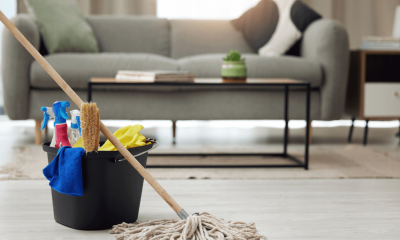Business
Why Commercial Cleaning Is Essential for a Healthy and Productive Workplace

A clean workplace isn’t just about appearances—it’s about creating a space that fosters health, productivity, and overall morale. As businesses become more aware of the importance of employee well-being, commercial cleaning is taking centre stage in ensuring a healthy work environment. From preventing the spread of germs to boosting employee satisfaction, the benefits of regular cleaning are undeniable.
In this blog, we’ll dive into why commercial cleaning is essential for any business and how it plays a crucial role in maintaining a productive and positive workplace. Whether you’re based in Melbourne, Perth, or anywhere in between, keeping your office clean is key to its success.
The Importance of Commercial Cleaning for Employee Health
- Prevents the Spread of Germs and Viruses
Offices are high-traffic spaces where germs can easily spread from one employee to another. The flu season, cold outbreaks, or even new viruses like COVID-19 can cause significant disruptions in the workplace. Regular commercial cleaning is the first line of defence.
- High-Touch Areas: Common areas like door handles, light switches, and elevator buttons are prime places where germs accumulate. Commercial cleaners ensure these areas are disinfected frequently, helping reduce the risk of illness spreading.
- Workstations and Desks: Studies show that desks are some of the dirtiest places in an office. Phones, keyboards, and mouse devices can carry more germs than you’d expect. A deep clean helps eliminate those pesky germs.
- Restrooms: No one likes using a dirty bathroom, and restrooms are high-risk areas for spreading germs. Routine cleaning keeps things hygienic and prevents the spread of bacteria like E. coli and salmonella.
In fact, research suggests that employees who work in clean environments are less likely to get sick. Less sick leave means more productivity, fewer disruptions, and an overall healthier workforce.
- Reduces Allergens in the Office
Dust, pollen, and other allergens can quickly accumulate in an office, especially in areas with carpets or poor air circulation. These allergens can trigger allergic reactions like sneezing, coughing, or itchy eyes, which lead to discomfort and reduced productivity.
- Air Quality: Commercial cleaners use professional-grade equipment to remove dust and allergens from the air, keeping the environment fresh and breathable.
- Carpet and Upholstery Cleaning: Carpets trap dust, dirt, and allergens, so regular cleaning is crucial to keeping them from becoming a breeding ground for bacteria and germs.
- Ventilation Systems: Offices often have air conditioning or heating systems that can accumulate dust and bacteria. Ensuring these systems are regularly cleaned helps maintain better air quality.
Regular cleaning reduces the presence of allergens and creates a more comfortable and productive atmosphere for employees.
The Impact of a Clean Workplace on Productivity and Employee Satisfaction
Let’s face it—no one likes working in a dirty or cluttered environment. A clean workplace not only looks appealing but also has a positive impact on employee morale. When employees work in an office that is neat, organised, and hygienic, it boosts their overall mood and motivation.
- First Impressions Matter: A tidy office creates a professional image when clients or visitors walk in. It sets the tone for how your company operates.
- Employee Well-Being: A clean office shows that the business cares about its employees’ health and comfort. This can lead to higher employee retention rates and a stronger company culture.
- Reduced Stress: Working in a clean space reduces clutter and distractions, allowing employees to focus on their tasks more effectively.
A tidy workspace is more than just pleasing to the eye; it has real psychological benefits that can translate into higher levels of employee satisfaction and improved job performance.
- Increased Focus and Concentration
Cluttered desks and dirty spaces can easily distract employees. In fact, research has shown that working in a messy environment can negatively affect concentration and problem-solving skills.
- Organised Spaces, Clear Minds: A clean and organised workspace promotes focus and efficiency, allowing employees to get through their work more quickly.
- Fewer Distractions: When employees don’t have to deal with dirty or cluttered areas, they can concentrate on their tasks without interruption, leading to higher productivity levels.
The cleaner the workspace, the clearer the mind, and the more productive the employee.
Areas in the Office That Need Regular Cleaning
Some areas in the office require constant cleaning due to their high usage or susceptibility to dirt and germs. Let’s break it down:
- Bathrooms
The bathroom is one of the most-used areas in any workplace. It needs regular cleaning to ensure hygiene and avoid unpleasant odours.
- Toilets and Urinals: These require frequent disinfecting to prevent bacteria build-up and maintain a fresh environment.
- Sinks and Counters: These areas are prone to soap scum, water spots, and germs. Regular cleaning ensures they stay hygienic.
- Floors and Walls: Bathrooms can easily accumulate dirt, so floors and walls should be cleaned frequently to keep them looking presentable.
A clean bathroom ensures employees feel comfortable and reduces the risk of spreading illnesses.
- Kitchens and Break Rooms
These spaces are often a hot spot for food-related spills, crumbs, and lingering odours. If not cleaned regularly, kitchens and break rooms can become breeding grounds for bacteria.
- Fridges and Microwave: Leftovers, food spills, and old food containers can lead to unpleasant smells and hygiene issues. Regular cleaning keeps the kitchen fresh and safe.
- Countertops and Tables: Wiping down counters after every meal prevents the buildup of grime and food particles.
- Floors: Spilled drinks and crumbs can create an untidy and unsafe work environment. Ensuring floors are swept and mopped regularly keeps things hygienic.
Keeping kitchens and break rooms clean encourages employees to use these spaces and reduces the risk of foodborne illnesses.
- High-Traffic Areas
High-traffic areas such as hallways, lobbies, and entryways are the first places people see when they enter the office. These areas need regular cleaning to maintain a professional look and ensure safety.
- Floors and Carpets: High foot traffic can leave dirt and debris behind. Regular vacuuming and sweeping ensure cleanliness and prevent the spread of germs.
- Doors and Handles: Entry doors and handles should be disinfected regularly, as they’re touched by everyone entering the building.
- Trash Bins: Emptying trash bins regularly and cleaning the bins helps keep odours at bay and reduces the risk of pest infestations.
High-traffic areas set the tone for the office environment, so it’s essential to keep them clean and welcoming.
- Workstations and Desks
Workstations are where employees spend the majority of their time, so keeping these areas clean is crucial.
- Keyboards and Mice: These items are touched constantly and can carry germs. Regular wiping and sanitising help keep them clean.
- Phones and Screens: Phones are hotbeds for germs, especially during cold and flu season. Wiping down screens and phones regularly is essential for hygiene.
- General Organisation: Employees should be encouraged to tidy their desks regularly, but commercial cleaners can assist with the deep cleaning of workstations.
A clean and organised workstation helps employees stay focused and productive.
Choosing the Right Commercial Cleaning Service
When selecting a commercial cleaning service, it’s important to choose one that meets the specific needs of your business. Here are some tips to help you find the right fit:
- Eco-Friendly Options
More and more companies are opting for eco-friendly cleaning services that use non-toxic, biodegradable products. These products are not only safer for employees but also better for the environment.
- Green Cleaning Products: Ask your cleaning company if they use environmentally friendly products.
- Sustainability Practices: Some companies prioritise sustainable practices, such as reducing water usage and using energy-efficient equipment.
- Flexibility in Scheduling
Choose a cleaning service that offers flexible scheduling to ensure that cleaning doesn’t interfere with your business operations.
- After-Hours Cleaning: Many businesses prefer cleaning after office hours, so it doesn’t disrupt daily activities.
- Customised Cleaning Plans: Every business is different. A good cleaning service should be able to tailor their services to meet the specific needs of your workplace.
- Reputation and Experience
It’s crucial to choose a cleaning service with a solid reputation and experience in commercial cleaning. Look for reviews, references, and certifications to ensure quality and professionalism.
- Customer Reviews: Online reviews or testimonials from other businesses can give you insight into the quality of service.
- Certifications: Look for certifications in health and safety standards to ensure your cleaning service meets industry guidelines.
Conclusion: Clean Spaces, Healthy Workplaces
Commercial cleaning is more than just a luxury—it’s a necessity for any business that wants to promote a healthy, productive, and positive work environment. From preventing the spread of germs to boosting employee morale, a clean office plays a significant role in the success of your business.
By ensuring regular cleaning, maintaining high standards of hygiene, and choosing the right cleaning service, businesses can enhance employee well-being and productivity. So, don’t overlook the power of cleanliness—it’s the key to a thriving workplace.
FAQs
Q1: How often should a commercial space be cleaned?
It depends on the size and type of business, but most offices benefit from cleaning 2-3 times a week. High-traffic areas should be cleaned more frequently.
Q2: Can I hire an eco-friendly cleaning service?
Yes, many commercial cleaning companies now offer eco-friendly cleaning options using biodegradable and non-toxic products.
Q3: How does a clean office affect employee productivity?
A clean office reduces distractions, boosts morale, and creates a healthier environment, all of which contribute to improved focus and productivity.
Q4: What areas should be cleaned regularly in an office?
Bathrooms, kitchens, high-traffic areas, and workstations should be cleaned regularly to ensure hygiene and prevent the spread of germs.
Q5: How can I choose the right commercial cleaning service for my business?
Look for flexibility in scheduling, eco-friendly practices, good reviews, and a solid reputation. Choose a service that understands your specific business needs.
Business
Micro SaaS for Solopreneurs: Building Small, Smart, and Profitable Tools

In today’s fast-paced digital world, solopreneurs — independent professionals running one-person businesses — are reshaping the economy. They crave tools that are affordable, easy to use, and built for simplicity. Enter the world of Micro SaaS — small, highly focused software-as-a-service products that solve very specific problems for very specific audiences.
Micro SaaS is no longer a niche trend; it’s becoming a sustainable and profitable business model for solo developers, freelancers, and small business owners who want to build scalable digital products without managing huge teams or large budgets.
What Is Micro SaaS?
Micro SaaS refers to small-scale, subscription-based software products that target a narrow audience or specific pain point. Unlike traditional SaaS businesses that require big teams and funding, Micro SaaS ventures are often created and managed by a single person or a tiny team.
Key characteristics of a Micro SaaS include:
- Low overhead costs – minimal infrastructure and marketing expenses.
- Niche-focused functionality – solves one key problem exceptionally well.
- Affordable pricing – typically under $50 per month.
- Independence and flexibility – perfect for solo founders managing everything from development to customer support.
For instance, a simple tool that automates client invoicing for freelance designers or tracks content ideas for social media managers could easily qualify as a Micro SaaS.
Why Micro SaaS Appeals to Solopreneurs
Solopreneurs are drawn to Micro SaaS because it aligns perfectly with their way of working — lean, agile, and independent. Here’s why this model resonates so strongly:
1. Affordability and Accessibility
Most Micro SaaS products come with low monthly subscriptions, often under $50. This makes them budget-friendly for independent business owners who need quality tools without enterprise-level costs.
2. Simplicity Over Complexity
These tools are designed with clarity and efficiency in mind. They focus on doing one thing well, avoiding unnecessary features that slow users down.
3. Automation and Time-Saving
Micro SaaS tools help automate repetitive tasks — from sending invoices to managing content calendars — allowing solopreneurs to focus more on their core business and less on admin work.
4. Community and Personalisation
Since Micro SaaS founders often engage directly with users, customers enjoy personalised support and quick updates — something large software companies often lack.
Building a Micro SaaS Product: From Idea to Launch
If you’re a developer, designer, or creative thinker, building your own Micro SaaS is entirely possible — even as a solo founder. Here’s a practical approach:
Step 1: Identify a Specific Problem
Look for everyday pain points in your niche. For example:
- Freelancers struggling to track billable hours.
- Social media marketers needing a simple idea tracker.
- Coaches wanting an easy way to onboard clients.
The more specific and repeatable the problem, the better.
Step 2: Validate Your Idea
Before you start coding, test your concept with potential users. Join online communities like Reddit, Indie Hackers, or Australian startup forums. Collect feedback and refine your solution early.
Step 3: Build the Minimum Viable Product (MVP)
Keep it simple. Focus only on the core features that solve the main problem. Use low-code tools or frameworks like:
- Bubble or Softr for quick app building.
- Firebase or Supabase for backend setup.
- Stripe for payments and subscriptions.
Step 4: Set the Right Price
Micro SaaS thrives on recurring, affordable pricing. Aim for a range between $10–$50/month, depending on the value and complexity of your solution.
Step 5: Market Your Product
Use content marketing, SEO, and social media to reach your niche audience. Share tutorials, case studies, and success stories. Engage in relevant communities and showcase how your tool makes life easier for solopreneurs.
Step 6: Scale Without Complexity
Once you have consistent users, focus on small improvements, automation, and customer retention. Keep your business lean — use analytics to guide updates and customer feedback for direction.
Marketing Strategies for Micro SaaS Success
Marketing can make or break a Micro SaaS. Since most solopreneurs don’t have large budgets, the key is to rely on organic, community-driven growth.
- Build in public: Share your journey on platforms like X (Twitter) and LinkedIn. Transparency builds trust and attracts early adopters.
- SEO and content marketing: Write blogs, tutorials, and guides that rank for long-tail keywords in your niche.
- Offer free trials: Let users experience the value before committing.
- Leverage partnerships: Collaborate with influencers or creators who share your target audience.
Scaling a Micro SaaS as a Solopreneur
Scaling doesn’t always mean hiring a team or chasing investment. Instead, focus on automation and sustainability:
- Automate onboarding, billing, and support where possible.
- Use AI tools for customer support and analytics.
- Outsource tasks like design or marketing when needed.
The goal is to build a self-sustaining business that continues to generate recurring revenue with minimal maintenance.
Also Read This: Boost Productivity and Mood with a Deep Cleaned Space
Final Thoughts: The Power of Tiny Software with Big Impact
The rise of Micro SaaS marks a new era for independent entrepreneurship. For solopreneurs, it’s not about building the next billion-dollar startup — it’s about creating sustainable, profitable, and meaningful software that serves a clear purpose.
Whether you’re a developer, a freelancer, or a marketer with a problem-solving mindset, Micro SaaS opens the door to freedom — allowing you to earn recurring income, work on your terms, and deliver real value to a focused community.
So, if you’ve ever dreamed of building your own digital product, now is the perfect time to explore the Micro SaaS path — one small solution at a time.
Automotive
The Long-Term Value of Car Detailing: How It Keeps Your Car Looking Fresh and Increases Its Market Value

Let’s face it—owning a car in Geelong is practically a rite of passage. Between weekend drives down the Great Ocean Road and zipping to footy training, your car sees it all. But with all that fun comes a fair bit of wear and tear. That’s where Geelong Car Detailing comes in to save the day—and your paintwork.
It’s not just for rev-heads or showroom show-offs. Detailing your car regularly helps it stay cleaner, drive better, and fetch more bucks when it’s time to sell. Simple as that.
What Car Detailing Actually Involves
It’s way more than a quick wash at the servo.
- Exterior Detailing: Hand washing, waxing, polishing, and sometimes even paint correction.
- Interior Cleaning: Vacuuming, shampooing carpets, leather conditioning, and deodorising.
- Engine Bay Clean: Removing grime and grease that builds up under the bonnet.
- Protective Coatings: Ceramic coatings or paint protection film to defend against UV and salt air.
Geelong’s coastal breeze may feel refreshing, but it can quietly rust your ride. A bit of regular detailing keeps it all in check.
How Detailing Protects Your Investment
Most folks think about servicing the engine, but what about your car’s appearance?
- Paint Protection: Regular waxing prevents fading, peeling and oxidation from the Aussie sun.
- Rust Prevention: Removing salt and grit from undercarriage and panels can save you \$\$\$ in repairs.
- Upholstery Longevity: Cleaning spills and dust means fewer cracks in leather or mould in carpets.
- Resale Value Boost: A well-detailed car can increase resale price by up to 15%, according to some dealers.
- Better First Impressions: Whether you’re picking up your in-laws or potential buyers—looks matter.
Think of it like going to the dentist. Painful if ignored, but smooth sailing with regular check-ups.
Why Geelong Locals Are Big on Detailing
From Belmont to Newtown, car pride is alive and well.
- Local roads mean dust, tree sap, and bird droppings—classic enemies of a clean car.
- Being near the sea adds salt spray into the mix, which is brutal on metal and paint.
- Many local businesses offer mobile services—so they come to you while you’re at work or watching the Cats play.
- Detailing services in Geelong are often cheaper than in big cities like Melbourne—winning!
And let’s not forget, a clean car just feels better to drive.
Average Car Detailing Benefits vs Cost Over 5 Years
| Detailing Frequency | Avg Annual Cost (AUD) | Paint Life Extension | Resale Value Boost |
| Twice a year | \$400 – \$600 | Up to 3 years | +10-15% |
| Once a year | \$200 – \$300 | 1–2 years | +5–8% |
| Not at all | \$0 | Paint fades in 2–3 yrs | 0% or negative |
Source: Based on Australian detailing averages and dealership resale data.
As the chart shows, skipping detailing might save you short-term, but it’ll cost you when it’s time to trade in.
Detailing Myths Aussies Should Ignore
Let’s bust a few classics, shall we?
- “It’s only for luxury cars” – Nope. Even your 2008 Corolla deserves some TLC.
- “A car wash does the same job” – Absolutely not. Wash and detailing are chalk and cheese.
- “Too expensive” – Basic detailing starts from just \$150 in Geelong. It’s cheaper than fixing paint damage.
- “Takes all day” – Most full details take 2–3 hours, or even less with express options.
A bit of upkeep goes a long way, just like brushing your teeth—only shinier.
Conclusion
Detailing is more than making your car look good for Instagram. In a place like Geelong where coastal life meets weekend adventures, Geelong Car Detailing helps keep your vehicle in top nick—inside and out.
It keeps the paint sparkling, the seats fresh, and your resale value sky-high. Whether you’re hitting Eastern Beach or parking outside the pub, a detailed car always stands out.
Think of it as giving your car a spa day—and trust us, it deserves it.
FAQs
1. How often should I detail my car in Geelong?
Every 6 months is ideal, especially with the coastal exposure to salt and sun.
2. Is car detailing worth the money?
Absolutely. It maintains your car’s value and appearance, which saves you money long-term.
3. Can I get car detailing done at home?
Yes! Many mobile services in Geelong will come to your driveway or workplace.
4. Does detailing include engine cleaning?
Some packages do. Always ask beforehand—engine bay cleaning helps with resale and maintenance.
5. Can detailing remove scratches?
Light scratches, yes. Paint correction and polishing can often make them disappear.
Financial
How a Tax Accountant Can Help You Navigate Complex Tax Filing Requirements

Tax season—just hearing the words can make anyone’s heart race. It’s the time of year when every individual or business must ensure they meet their tax obligations and take full advantage of any tax deductions. But let’s face it, tax filing can be more confusing than a kangaroo at a fancy dress party. That’s where a tax accountant comes in, offering professional expertise to guide you through the complexities of the system.
If you live in Williams Landing or anywhere in Australia, having a tax accountant by your side can be a game-changer. In this article, we’ll explore how a tax accountant can help you navigate the often tricky waters of tax filing, ensuring compliance while maximising your return.
What Does a Tax Accountant Do?
At its core, a tax accountant helps individuals and businesses prepare and file their taxes. But it’s not just about filling out forms—it’s about understanding the nuances of tax law to ensure that you are compliant, efficient, and minimising the taxes you owe.
Core Responsibilities of a Tax Accountant:
- Tax Preparation: Organising and preparing your tax return to ensure all necessary documents are in place.
- Tax Advice: Offering expert advice on tax-saving strategies and legal ways to reduce taxable income.
- Tax Filing: Filing your tax return accurately and on time to avoid penalties.
- Audit Assistance: Providing assistance if you are selected for a tax audit, ensuring that all required documentation is in place.
Hiring a tax accountant ensures that your tax filing process is stress-free and handled with precision. Let’s dive deeper into how they can help.
Why Should You Hire a Tax Accountant in Williams Landing?
Living in Williams Landing (or anywhere in Australia) presents its own unique set of tax challenges. The tax system is ever-evolving, with frequent changes in tax laws, deductions, and credits. With so many moving parts, hiring a tax accountant who understands the local landscape and the broader national tax system is essential.
Key Benefits of Hiring a Tax Accountant:
Expert Knowledge of Tax Laws: Tax laws can change year by year, and a tax accountant stays up to date on all the latest amendments and deductions, ensuring you don’t miss out on potential savings.
Maximising Deductions: A good tax accountant will know exactly what deductions apply to your situation. This might include work-related expenses, health care costs, or even charitable donations.
Avoiding Mistakes: With complex tax forms, small mistakes can lead to penalties. A tax accountant ensures that your tax return is accurate and compliant with the law.
Time-Saving: Instead of spending hours navigating confusing paperwork, a tax accountant can complete the process efficiently, giving you more time to enjoy life.
Stress-Free Tax Season: Handling your taxes can feel like a full-time job. A professional will take the burden off your shoulders, allowing you to focus on what matters most.A tax accountant helps save time, money, and the headache of figuring it all out on your own
Common Tax Filing Challenges a Tax Accountant Can Help With
Tax filing isn’t always a straightforward process. From deductions to various types of income, there are plenty of nuances that can trip up even the most diligent filer. Here’s where a tax accountant truly shines, guiding you through complex filing requirements.
Challenges Tax Accountants Help You Overcome:
- Multiple Sources of Income: If you have a side business, rental property, or freelance work in addition to your regular job, a tax accountant can handle the complexities of multiple income streams.
- Capital Gains Tax: Selling investments like stocks or property can trigger capital gains tax, and an accountant will help you minimise this tax through various strategies, such as offsetting losses.
- Deductions for Small Businesses: For small business owners, navigating allowable business expenses and understanding GST can be overwhelming. A tax accountant can guide you through the process and ensure you’re claiming all the deductions you’re entitled to.
- Superannuation: A tax accountant helps ensure that your superannuation contributions are made efficiently, maximising your retirement savings and minimising tax liability.
- Tax Audits: If the tax office comes knocking, a tax accountant will help you navigate an audit, ensuring that all required documents are provided and that you’re in compliance.
By having an expert in your corner, you ensure that you are always on the right side of the law, avoiding potential pitfalls.
How a Tax Accountant Can Help You Save Money
While hiring a tax accountant may come with a fee, the potential savings they can help you achieve are often much higher. Here’s how they can help keep more money in your pocket:
Money-Saving Tips From Your Tax Accountant:
- Claiming Deductions: A tax accountant can identify deductions you may have missed, such as home office expenses or work-related travel costs.
- Tax-Effective Investment Strategies: Whether you’re planning for retirement or investing in property, a tax accountant can guide you on tax-effective strategies to grow your wealth while minimising tax obligations.
- Capital Gains Tax Minimisation: By selling assets strategically, you can reduce your capital gains tax, a key area where a tax accountant provides expert advice.
- Small Business Tax Planning: For business owners, a tax accountant ensures you’re utilising the right strategies to minimise tax, like paying yourself a tax-effective salary or taking advantage of business tax deductions.
A tax professional helps ensure you maximise every opportunity to reduce your tax burden, turning what might seem like an unnecessary expense into an investment that pays off.
The Cost of Hiring a Tax Accountant in Williams Landing
Hiring a tax accountant may seem like an additional expense, but it’s one that often pays for itself through the savings and benefits they can provide. Below is a rough guide to what you can expect to pay for tax services in Williams Landing.
Service Average Cost (AUD) Why It’s Worth It Individual Tax Return $150–$350 Professional accuracy and maximised deductions. Small Business Tax Return $500–$1,500 Optimising tax deductions and business expenses. Capital Gains Tax Advice $100–$250 per hour Minimising tax on investment returns. Tax Planning Services $250–$500 Long-term savings through strategic planning. GST and BAS Services $150–$350 Ensures compliance with GST requirements.
The cost of hiring a tax accountant is typically offset by the savings they help you achieve, whether through better tax planning, missed deductions, or reducing your tax obligations.
Conclusion
In conclusion, hiring a tax accountant in Williams Landing can provide invaluable assistance when navigating complex tax filing requirements. From helping you save money through deductions to providing expert advice on tax planning, a professional can ensure your taxes are in order and you’re compliant with the law. Whether you’re an individual or a small business owner, partnering with a tax accountant gives you peace of mind during tax season and throughout the year.
FAQs
1. What’s the difference between a tax accountant and a general accountant?
A tax accountant specialises in tax law and filing returns, while a general accountant covers broader financial tasks, including bookkeeping and financial reporting.
2. How do I know if I need a tax accountant?
If you have complex income streams, investments, or a small business, it’s best to consult a tax accountant to ensure you’re filing accurately and maximising deductions.
3. How much does a tax accountant cost in Williams Landing?
Fees can vary based on the complexity of your return. Typically, individual tax returns range from $150–$350, while business returns may cost more.
4. Can a tax accountant help with tax audits?
Yes, a tax accountant can provide crucial assistance during a tax audit, ensuring all necessary documentation is in place and that you comply with tax office requirements.
5. How can I find a good tax accountant in Williams Landing?
Look for a tax accountant who specialises in your needs, whether it’s personal tax, business, or investments. Checking reviews and asking for referrals can also help.
-

 Melbourne9 months ago
Melbourne9 months agoThe Science Behind Melbourne’s Unpredictable Climate: What’s Really Going On?
-

 Food10 months ago
Food10 months ago5 Must-Try Halal Restaurants You Can’t Miss in Geelong
-

 Food10 months ago
Food10 months agoTop 3 Halal Restaurants in Ballarat You Must Try
-

 Eco Friendly3 years ago
Eco Friendly3 years agoPlastic-Free Coffee Makers: Myth or Must-Have?
-

 Food10 months ago
Food10 months agoComparing the 4 Best Burger Joints in Werribee
-

 Healthcare4 years ago
Healthcare4 years ago7 Top NDIS Providers in Melbourne That’ll Make Life a Whole Lot Easier
-

 Food9 months ago
Food9 months agoBest Indian Cuisine in Perth: Top 5 Restaurants You Must Try
-

 Automotive10 months ago
Automotive10 months agoHow to Secure the Best Car Finance Deal: Tips for Negotiating and Saving Money





